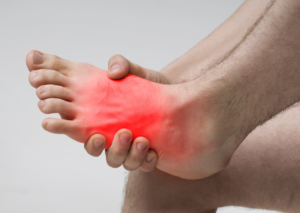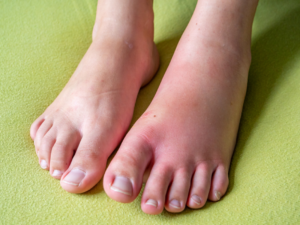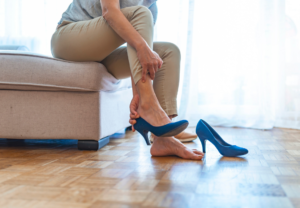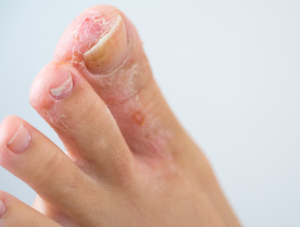
 When your feet like they’re on fire, standing, walking and even getting out of bed can quickly become daunting tasks. Whether this burning sensation is constant or changes in intensity during the day, you don’t have to accept your current level of pain and discomfort as your long-term reality.
When your feet like they’re on fire, standing, walking and even getting out of bed can quickly become daunting tasks. Whether this burning sensation is constant or changes in intensity during the day, you don’t have to accept your current level of pain and discomfort as your long-term reality.
Here at My FootDr, our podiatrists work with patients to help manage and reduce the occurrence or intensity of these burning sensations, alongside any other symptoms that may accompany them. Our goal is to help you maintain your quality of life, mobility, comfort and independence.
As there are a variety of causes that can contribute to the burning feeling in your feet, today we’ve taken a look at the four most common causes of burning feet we see in our podiatry clinics, and a few home-care tips for burning feet that may help.
1. Nerve Damage
 Nerve damage is the primary cause of a burning feet syndrome, also known as Grierson-Gopalan syndrome. Our nerves are responsible for relaying and interpreting the sensations we feel all around our body, and damaged, overactive nerves often result in those burning feelings when they misfire and send pain signals to the brain without any heat source or reason.
Nerve damage is the primary cause of a burning feet syndrome, also known as Grierson-Gopalan syndrome. Our nerves are responsible for relaying and interpreting the sensations we feel all around our body, and damaged, overactive nerves often result in those burning feelings when they misfire and send pain signals to the brain without any heat source or reason.
Neuropathy is the medical term for this occurrence, and alongside burning, you may also feel a number of other unpleasant sensations including pain, pins and needles, tingling, weakness, numbness and sensitivity.
Sometimes, nerve damage only affects a small part of the body like a single toe, but it can also affect entire limbs. The symptoms range from mild or severe, depending on the extent to which the nerves have been affected. Common causes of nerve damage and neuropathy include:
- Diabetes – this is the leading cause of neuropathy—whether it is type 1 or type 2. With the body being unable to clear sugar from the body effectively to use it, this can lead to damage to both nerves and blood vessels over time
- Alcohol Abuse – alcohol-induced nerve damage is a permanent condition, but certain measures can be taken to prevent further damage and even promote nerve recovery, like limiting alcohol consumption
- Vitamin Deficiency – burning feet syndrome due to vitamin deficiencies is most common in the elderly, and the vitamins you may be missing include B12, B6 and B9 (folate). Vitamin B deficiencies can also cause anaemia, which can make you feel dizzy, tired, and out of breath
- Exposure to Toxins – your nervous system is more fragile than you may think. Exposure to toxins such as heavy metals and industrial chemicals can also cause nerve damage, especially if the exposure occurs frequently over a long period
2. Inflammation
 Whether it’s from an injury like muscle or bone damage, or from an inflammatory medical condition like rheumatoid arthritis, when there is inflammation, you have more blood flowing to the area which results in swelling, redness and heat.
Whether it’s from an injury like muscle or bone damage, or from an inflammatory medical condition like rheumatoid arthritis, when there is inflammation, you have more blood flowing to the area which results in swelling, redness and heat.
If your burning is linked to any inflammation, there will be an underlying cause – and it’s very important to find that cause and treat it. Especially given that one of these causes is infection. When you have an infection, your body sends infection-fighting blood cells which can make the area feel warm to the touch. Always keep a lookout for other signs of infection and see your podiatrist if you notice these in your feet:
- Swelling, especially when it’s localised to a specific area
- Redness
- Pain, especially when pressing on specific areas of the feet and legs
- Developing a fever
3. Tight footwear and unsuitable socks
 When you wear shoes that are too tight, they can restrict your circulation, and result in your feet feeling hot, as well as numb and tingly. They are also more prone to rubbing against the feet, which can cause damage to the skin and bring with it redness and heat.
When you wear shoes that are too tight, they can restrict your circulation, and result in your feet feeling hot, as well as numb and tingly. They are also more prone to rubbing against the feet, which can cause damage to the skin and bring with it redness and heat.
Wearing shoes and socks made of irritating synthetic materials can also contribute to the heat, both from the irritation from the materials themselves and from failing to wick moisture away from the feet. In this case, you will tend to feel the burning feelings most during the day when you’re in your shoes.
4. Athlete’s foot
 Athlete’s foot is a fungal skin infection that affects the skin on the bottom of the feet and between the toes. The effects of the fungus on the skin, paired with the warm, moist conditions often inside our shoes in which the fungus thrives, leads to the feeling of burning and itching of the feet.
Athlete’s foot is a fungal skin infection that affects the skin on the bottom of the feet and between the toes. The effects of the fungus on the skin, paired with the warm, moist conditions often inside our shoes in which the fungus thrives, leads to the feeling of burning and itching of the feet.
To learn more about what causes athlete’s foot and how to treat it, click here.
Treating Burning Feet: Relieve Pain at Home
Getting effective relief from the burning feeling does depend on the cause of your discomfort, but these tips may help:
- Change into comfortable, supportive open sandals like these to help air your feet, reduce moisture, remove any tightness on your feet from your shoes, and cool your feet
- Alternate between shoes daily to allow the shoes to completely air and dry, preventing trapped moisture to irritate your feet
- Treat any fungal skin infections or other infections
- Address any nutritional deficiencies or metabolic disorders that may be contributing to the burning feelings with regular check-ups with your GP or specialist
- Elevate your feet to help promote blood flow and relieve any swelling
And most importantly, get help if you’re concerned or have accompanying pain
If you’re not sure why your feet feel like they’re hot, getting a diagnosis is the first place to start. Burning sensations and pain never occur for no reason – there’s always an underlying cause, and so should not be ignored, especially as they may have simple solutions to end your discomfort.
My FootDr has clinics around Australia dedicated to helping you stay healthy on your feet, so you can lead your best life. Book your appointment online by clicking here or call us on 1300 FOOT DR.


